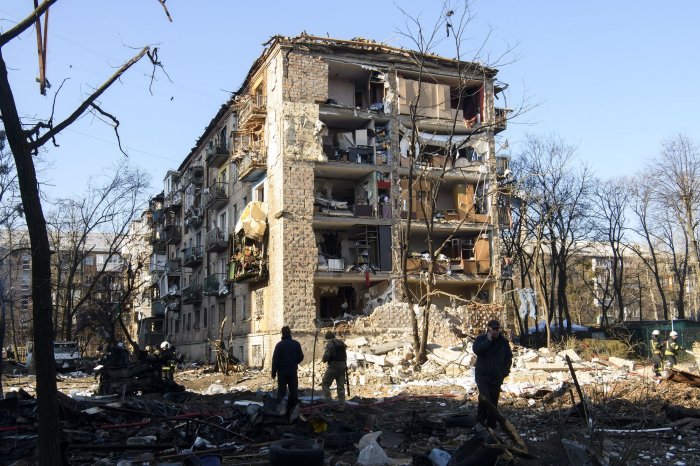1 of 4 | U.N. Humanitarian Affairs Deputy Emergency Coordinator Joyce Msuya said Tuesday that more than 1,230 U.N. personnel now working in humanitarian hubs throughout Ukraine. Photo by Mykola Tys/EPA-EFE
March 29 (UPI) -- A United Nations Humanitarian Affairs representative said Tuesday that aid efforts in Ukraine are ramping up more than a month after Russia invaded the country.
More than 1,230 U.N. personnel are working in humanitarian hubs across the country while humanitarian organizations have reached about 890,000 people since the invasion began on Feb. 24, U.N. Humanitarian Affairs Deputy Emergency Coordinator Joyce Msuya said in an address to the U.N. Security Council.
"We are working around the clock to reach more and more people in need," Msuya said. "The U.N. and our humanitarian partners are working impartially and relentlessly to uphold humanitarian principles, negotiate safe passage in and out of encircled areas for one cause alone: to provide life-saving assistance.
Msuya noted that the first U.N.-organized humanitarian convoy reached Sumy on March 18 to deliver 130 tons of medical supplies, water, ready-to-eat-meals and canned food for 35,000 people along with essential equipment to repair water systems and improve water access to about 50,000 people.
On Monday, a second convoy arrived in Kharkiv to provide supplies of food and other essential relief items, and emergency health kits and medicines.
"Ukraine is a humanitarian paradox: Side by side with extreme violence we see extreme kindness, profound solidarity and the gentlest of care," she said.
Msuya also said that an estimated 10 million people have been forced out of their homes as a result of the invasion.
Among those are 6.5 million people displaced within Ukraine and an additional 3.9 million that have crossed into neighboring countries seeking refuge from the war.
Earlier this month, U.N. High Commissioner for Refugees Filippo Grandi said that most of the refugees, about 2 million, left Ukraine for Poland -- a member country of the European Union's Schengen Area, which allows people to move freely between countries.
Another 306,000 refugees have fled to Hungary while 246,000 fled to Slovakia, both of which are inside the Schengen Area, and 527,000 have fled to Romania while 362,000 have fled to Moldova.
Msuya went on to assert that "detailed, realistic agreements on humanitarian cease-fires and pauses" are needed to ensure that aid is able to make its way into the country and people are able to seek refuge outside of it.
She added that the war in Ukraine represents "an opportunity" for predators and human traffickers and that the United Nations is scaling up protection services at the borders and providing information on safer routes and access to helplines and safe shelter for Ukrainians fleeing the country.
"Humanitarian organizations are worried about the risk of trafficking, as well as sexual violence, exploitation and abuse in Ukraine and the region," Msuya said. "Predators are luring single parents on the road with promises of transport and accommodation."
Ukrainian service members stand beside a damaged building in a residential area after shelling in Kyiv, Ukraine, on March 18. Photo by Vladyslav Musiienko/UPI |
License Photo
















